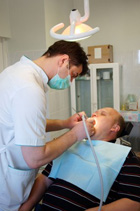 Dental check-ups are essential, there is no question about that. So why do so many people still place visiting the dentist at the bottom of their list of priorities? Perhaps it is the hassle of making time to fit in an appointment, or perhaps the childhood fear of visiting the dentist really has followed us into adulthood. Either way, there should be no excuses; dental check-ups are imperative for maintaining good oral hygiene and preventing the onset of gum disease and tooth decay.
Dental check-ups are essential, there is no question about that. So why do so many people still place visiting the dentist at the bottom of their list of priorities? Perhaps it is the hassle of making time to fit in an appointment, or perhaps the childhood fear of visiting the dentist really has followed us into adulthood. Either way, there should be no excuses; dental check-ups are imperative for maintaining good oral hygiene and preventing the onset of gum disease and tooth decay.
In this day and age, adults are consuming the same, if not more, sugar-laden food than children and are at just the same risk of developing cavities and requiring, sometimes painful, fillings. There are plenty of dental clinics in Central Leeds and an appointment should be made for every six months in order to keep on top of any problems that may be lurking underneath the surface of your teeth.
It may be that when looking at your teeth in the bathroom mirror you see a perfect set of pearly whites. However, neither the bacteria that causes gum disease or the bacteria that causes tooth decay can be seen by the naked eye, only your dentist will be able to inform you of any problems you have and only your dentist will know the correct treatment to offer you.
So whatever your excuses for not visiting the dentist are, forget them. Your oral hygiene is more important than you realise, it can actually affect your overall well-being and if that isn’t worth taking ten minutes out of your day for, I don’t know what is.















